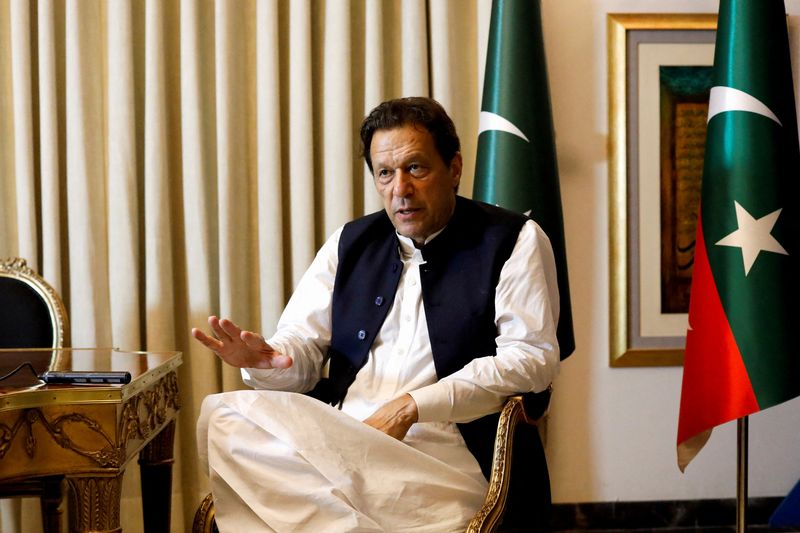By Asif Shahzad
ISLAMABAD (Reuters) - Pakistan's former Prime Minister Imran Khan, convicted in a graft case, has been jailed for three years in a fresh setback to the 70-year-old former cricket hero's political career.
Khan, Pakistan's main opposition leader, faces a long legal battle to save his political career ahead of a national election expected later this year.
Here are the key questions about his future:
IS KHAN'S POLITICAL CAREER OVER?
The law says such a conviction carries a disqualification from holding public office, the length of which will be decided by the Election Commission of Pakistan.
Legally, that could be a maximum of five years starting from the conviction date. But the Supreme Court could impose a life ban if it ruled that he was guilty of dishonesty and so could not meet the constitutional requirement for public office holders to be "truthful" and "honest". Such a ruling was made against three-times Prime Minister Nawaz Sharif in 2018.
In either case, Khan faces being excluded from the next general election due by November.
Compounding his woes is his continuing standoff with the country's powerful military, whose support is key for anyone vying to rule the country of 241 million people. Khan accuses the military of being behind his ouster and a crackdown on him and his party.
The military denies this, but his rhetoric targeting the military and its top brass has not eased.
Nevertheless, Pakistani political history contains a string of examples of leaders who have gone to jail and emerged more popular on their release - both Nawaz Sharif and his brother Shehbaz, the current prime minister, spent time in prison on corruption charges before being returned to power, as did former President Asif Ali Zardari.
WHAT ARE KHAN'S LEGAL RECOURSES?
Khan's lawyers will contest the conviction in higher courts and there are still two stages of appeal left for him, up to the Supreme Court. Khan could get some respite if his sentence was suspended while his appeals are fought.
Theoretically, if the conviction was suspended, Khan could still be eligible to contest the next election.
The decision to convict Khan has come in for criticism from bar associations, who say it was done in haste and he was not allowed to present his witnesses. The court said Khan's legal team witnesses were not relevant to the case.
The court had expedited the trial after Khan refused to appear before it for months despite being summoned repeatedly.
However, this is just one of more than 150 cases being prepared against him, including two major cases that are well advanced - a land fraud case and charges of abetting attacks on the military in the aftermath of his arrest in May.
He is likely to be shuttled from one court to the other as he serves the three-year jail term.
WHAT HAPPENS TO KHAN'S PARTY?
With Khan in jail his party, the Pakistan Tehreek-e-Insaf (PTI), is now being led by former Foreign Minister Shah Mahmood Qureshi.
The party was already severely hobbled by the departure of many key leaders in the aftermath of the May 9 violence and the crackdown that ensued. Some leaders and hundreds of workers remain detained.
While the party remains hugely popular, according to polls, it ran mostly on Khan's individual charisma. Qureshi does not have such a personal following, and will be unable to match the cricket hero's organisational capabilities.

Even after being banned from television screens, Khan kept his supporters motivated by engaging them on various social media forums such as Tiktok, Instagram, X, and, in particular, through almost daily YouTube speeches. That will no longer be available.
Analysts, however, say he could bounce back if his party's vote holds up strongly in the election.